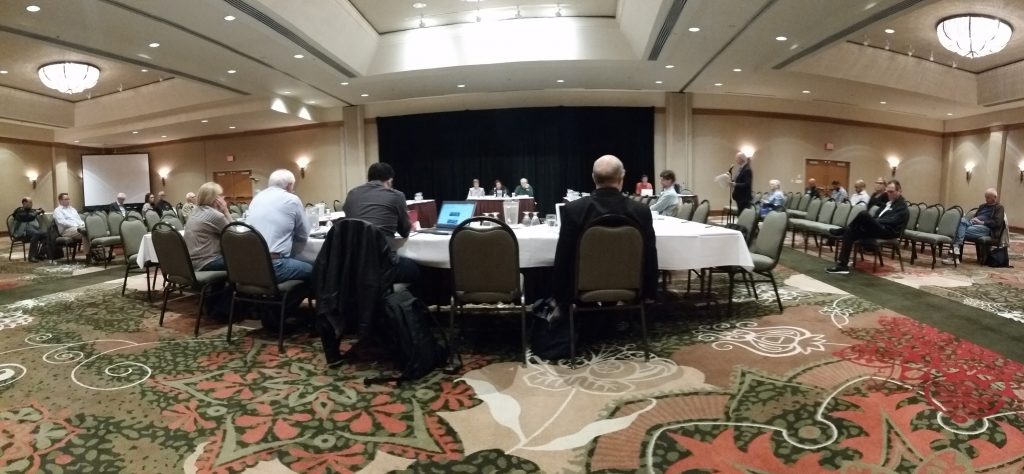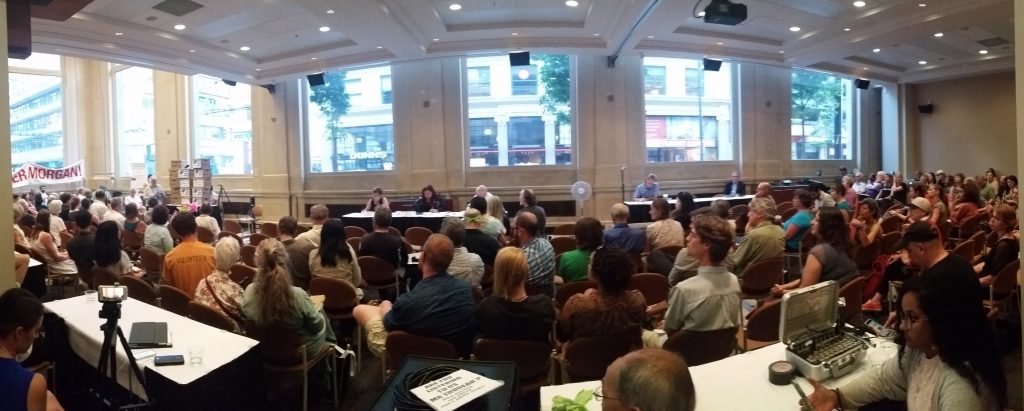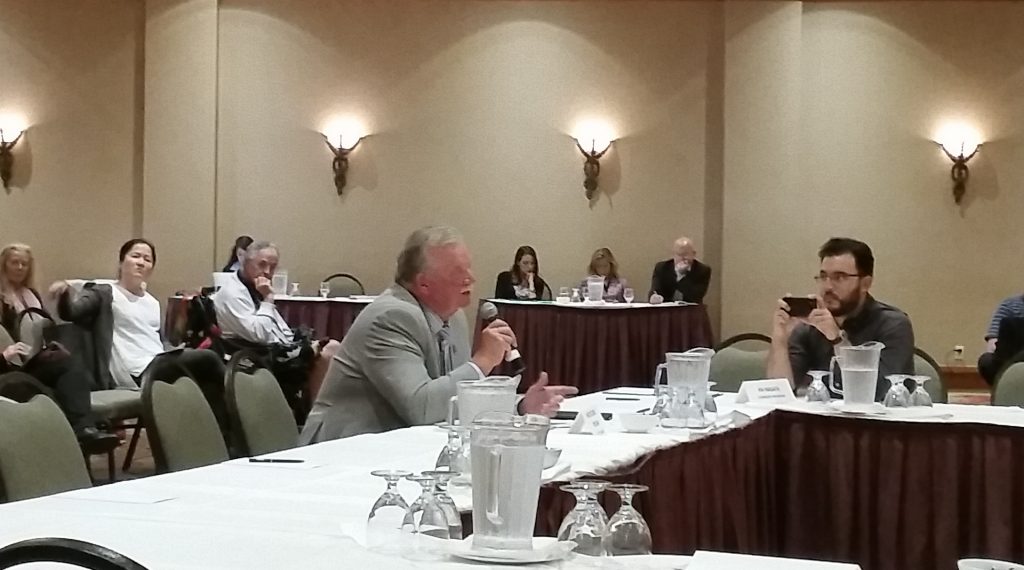For reasons probably not relevant to this discussion, I attended a couple of the “Trans MountainPipeline Expansion Project Ministerial Panel” public meetings in Burnaby and Vancouver.
For those who have not been keeping track, here is the TL;DR background condensed to a single run-on sentence:
An American tax-dodge scheme called Kinder Morgan bought a 50-year-old oil pipeline from Alberta to Burnaby, and now wants to replace and twin it, tripling capacity, and shipping mostly diluted bitumen for quick export via daily Aframax tankers berthing in Burrard Inlet, which previously would have required an Environmental Assessment, but the Harper Government changed the rules in 2012, giving an Oil and Gas Regulator/Booster in Calgary called the National Energy Board the ability to review and approve the project, which they unsurprisingly did in May 2016 despite significant local and First Nations pushback, causing the new Trudeau government to say “hold yer horses, Cowboys” and strike a new “ministerial” panel that will be doing further stakeholder, community, and first nations outreach to “seek additional views that could be relevant to the Government’s final decision on the project”, a panel whose validity is being questioned by many critics, as its Chair was, until recently, working with Kinder Morgan.
I went to the meetings as an observer, not a presenter, so this post is made up of my impressions of the presentations of others. You may not agree with them (me?), and although the public meetings are pretty much wrapped up now, you can still take part by sending your comments or filling out a questionnaire here.

The roundtable I attended in Burnaby took place in one of those familiar hotel convention rooms, all crystal chandeliers and pukey carpets, which was essentially empty for most of the day, with many more seats than participants. Right from the get-go, it was hard to determine what the actual plan for the day was.
The morning session was meant to feature “Environmental NGOs” (I counted three), with two later sessions featuring “Local Governments” (a total of four, including New Westminster, who were well represented by City staff). There was no fixed agenda, so there was no idea who was presenting when, and any member of the public was apparently able to sign up and get their time at the microphone after the pre-designated speakers were finished. There was a polite request that each of the speakers would have 5 minutes, but there was no timekeeping, and some presenters went on for better than a half an hour.
In her introductory remarks, the Chair instructed the audience that this was meant to be an “informal dialogue”. They appeared to have perfectly nailed in the “informal” part, but the dialogue was distinctly lacking. In three sessions totalling almost five hours, I can recall a single instance where a Panel Member asked a follow-up question of a presenter. Even when directly asked questions by presenters, the Panel members seemed unable (unwilling?) to answer, but more on that later.

The Vancouver event was crowded and went well into the night, where the lack of any formal organization led to the inevitable. There was a significant presence of the patchouli and gorp crowd that, as usual, had a frustratingly hard time keeping on topic. Concerns were expressed about everything from Site C to salmon farming to LNG. At one point, a gentleman came to the microphone cradling what was, apparently, a plastic doll swaddled in a blanket and finished his talk with a short a cappella folk song of sorts. Perhaps I missed the point. No, I’m almost positive I missed the point.
However, there were also several compelling arguments offered, including the failure of the NEB process to address significant concerns with this project, questions about the ability of the Federal Government to respond to a significant spill in the Canadian half of the Salish Sea (the risk of which will clearly increase if this project is approved), and questions about how Canada will meet its stated GHG emission goals if Oil/Tar/Bituminous Sands developments proceed at the pace outlined in the business case for this project. The one question hanging over the entire proceeding was clearly “Why?” How is accelerating the extraction of a non-renewable resource for rapid export in the “National Public Interest”?
It was the sparsely-attended Burnaby event that was actually more interesting. Mayor Corrigan of Burnaby, love him or hate him, can be a hell of an effective orator, and he was on his game this day. He spoke clearly without notes for about a half hour, and despite his reputation for, uh… being outspoken, he was respectful and calm for the length of talk. He started by talking about the history of the existing Trans Mountain pipeline, and how 50 years ago Burnaby consented to a cooperative-owned pipeline to supply the 5 refineries around the Burrard Inlet because of the important local jobs and domestic supply needs it represented. He also spoke of the history of Burnaby gifting Burnaby Mountain to the University, then buying large portions of it back 40 years later to protect the conservation area that had become so important to Burnaby and the region.

He went through how his Council and Staff evaluated the Kinder Morgan proposal to “twin” the pipeline, primarily for export, and in comparing the significant costs and limited offsetting benefits, determined it was not in the interest of the City. They then learned about the National Energy Board, a non-elected body in Calgary made up of (mostly) former energy executives, who would be tasked with reviewing the project to determine if it was in the “national public interest.” They identified fairly quickly that there is no national plan to develop our hydrocarbon industries or to manage our non-renewable resources over the short or long term, making determination of how any project fit within something called the “national public interest” a very difficult thing to determine. At no point was there an explanation of what the “national public interest” was, nor a discussion of how one would measure it. For a Municipal Politician, whose job it is to plan and make those plans a reality, the complete lack of planning or even a clear definition of a goal, was shocking.
Further, going through the process with the National Energy Board, the City of Burnaby (along with most everyone else involved) soon discovered that the hearing process was cumbersome, chaotic, and lacking in some pretty fundamental protections that a formal hearing should have, such as the ability to cross-examine witnesses and test the evidence that has been presented to assure it was credible and had merit. In challenging the process, Burnaby discovered that Kinder Morgan’s legal fight was funded by a special surcharge on the pipeline use approved by the NEB, a source of funds not available to local governments and other stakeholders in the process, and that the NEB was not made up of a broad representation of citizens from across BC and Canada who can fairly evaluate what is reasonable to the general public, but are drawn from within the Oil and Gas industry and friends of the (at the time) oil-soaked federal government.
After discussing some of the technical and safety concerns the City of Burnaby has, and the inadequate responses to these risks provided in the “conditions” to the NEB approval, Corrigan compared these to the inferred benefits: maintaining some jobs in Alberta to accelerate the removal of harder- and harder-to-extract oil reserves so they can be exported faster for the benefit of a few multinationals,with little or no long-term evaluation of Canada’s long-term petroleum needs. Are the needs of future generations included in “the national public interest”?
He summed up by calling the Panel out for what they really are – a political body comprised of two former politicians and a former Deputy Minister – and the review for what it is – a political process to correct the fundamental flaws of the NEB process that Prime Minster Trudeau recognized prior to his election. In summary, the Mayor quoted the Prime Minister, stating “Government can grant permits, but it’s communities that grant permission.”
He then put a period on that point: “Well, we don’t.”
I was also fortunate to have heard Kai Nagata from the Dogwood Initiative ask some rather pointed questions to the Panel, for which he received respectful non-answers. To paraphrase heavily from my memory, the exchange went something like this:
Q: Who was invited to speak? Is there a list of which organizations were sent invitations? What efforts were taken to get the word out to impacted parties, so they can take time from their summer schedules to take part? Was there any vetting of the people who wished to take part?
A: There is no list. Everyone was invited. Anyone can speak.
Q: So you are taking anything from anyone. How are you vetting the information received? With no opportunity for cross-examinations, how are you assessing the strength of evidence? What measures are you taking to determine if the voices you are hearing represent a fair cross section of stakeholders, or the general public. What processes have you brought to weigh the evidence you have received, and where is that process explained?
A: We are here to listen, and we will produce a report summarizing what we hear.
Q: There does not appear to be any official recording or video of these hearings, nor does it appear that official transcripts are being produced. Some presenters have provided you written materials, how will the record of these hearings be entered in to the official record, and how with the public know what transpired here? What process exists to assure the public input is fairly reflected in the report you provide to the Minister, or that the written evidence you have received has been vetted for accuracy?
A: We are here to listen, and we are taking notes, there are no official transcripts.
Q: So with no formal process to solicit input or assure the presenters are representative of the community, no vetting of the information you hear, no process to determine the validity of evidence, and no official record of what transpires – how will this Panel, to quote the Prime Minister “restore public trust and confidence in Canada’s environmental assessment processes”?
A: Hrrm…
I don’t mean to come down hard on the Panel Members. They were hastily called up and thrown into a hastily assembled process, with a mandate that may appear simple, but suffers from a lack of definition or process. Their job is to report to the Minister with some ideas or impressions of whether this project, a narrowly defined pipeline delivering and extra 600,000 barrels a day of products to the Pacific Coast primarily for export through Burrard Inlet, is in the “National Public Interest.” Unfortunately, they have not been provided the tools to define, never mind measure, such an ethereal concept. This “informal” and apparently ad-hoc process is not going to get them any closer to that definition.
Nor will this process restore the public trust in the way the Prime Minister anticipated. The only question remaining is whether he has the political courage to stop this project based on this failure, because it has not moved him any closer to receiving a mandate to approve it.
Now they can say they have done their consultation. There is some interesting information here: https://www.neb-one.gc.ca/bts/whwr/index-eng.html I did find a somewhat disturbing description: The National Energy Board (NEB) is recognized as the senior energy regulatory agency in Canada.
The National Energy Board is a court of record, with the powers, rights and privileges of a superior court, established in 1959 by the National Energy Board Act. For major applications and inquiries, the Board holds public hearings at which parties must submit evidence into the public record and decisions must be based on the evidence submitted. Does this mean no government oversight?
And this interesting line: oil and gas exploration and production activities in specified areas that are not regulated under joint federal/provincial accords. Scary